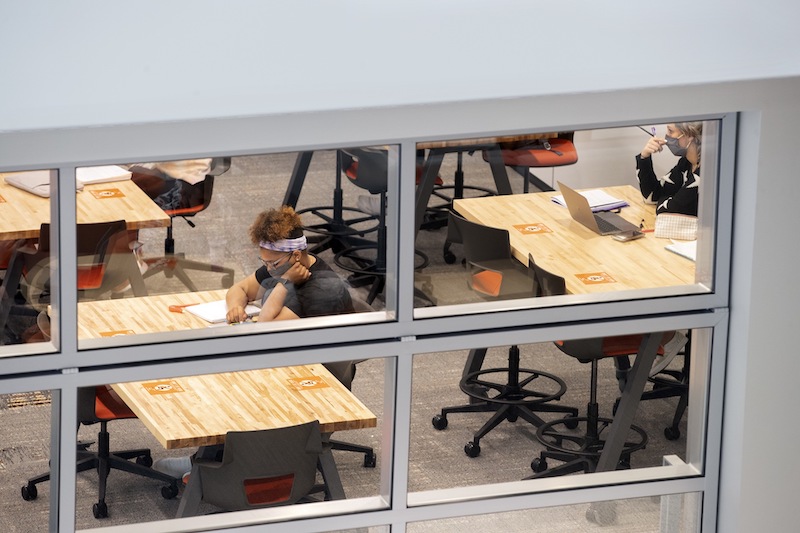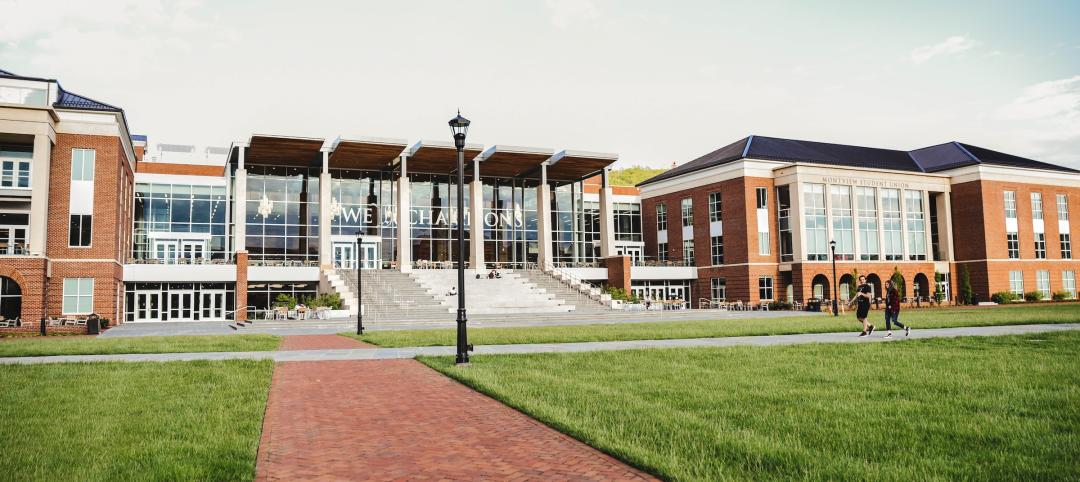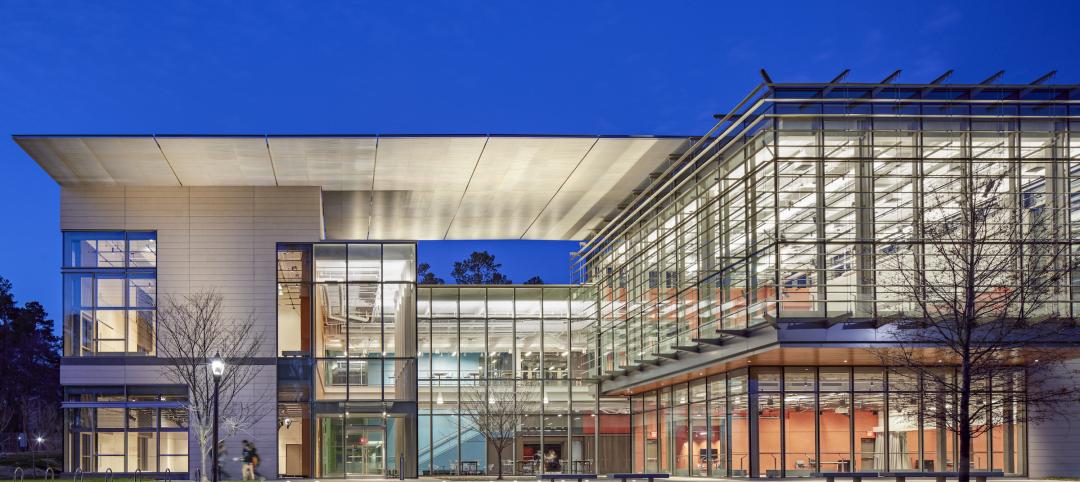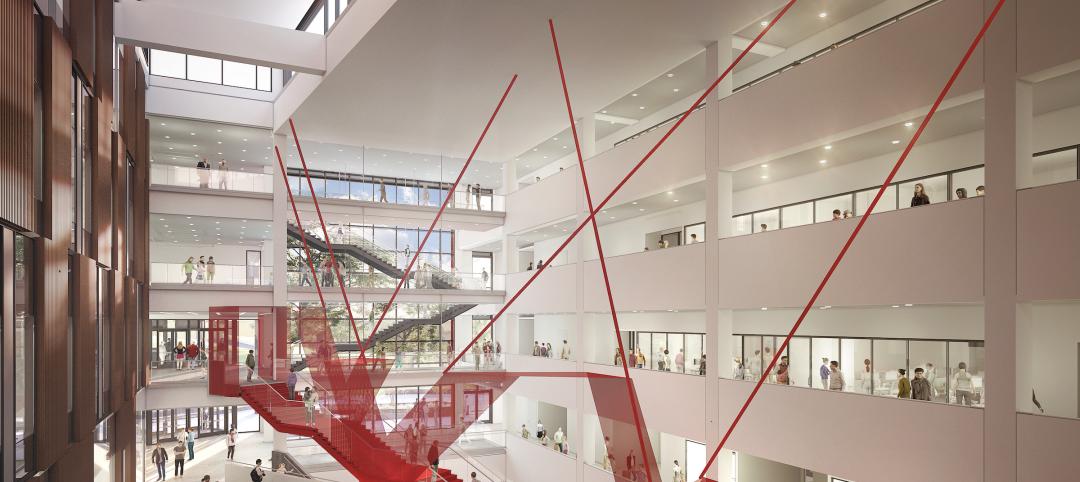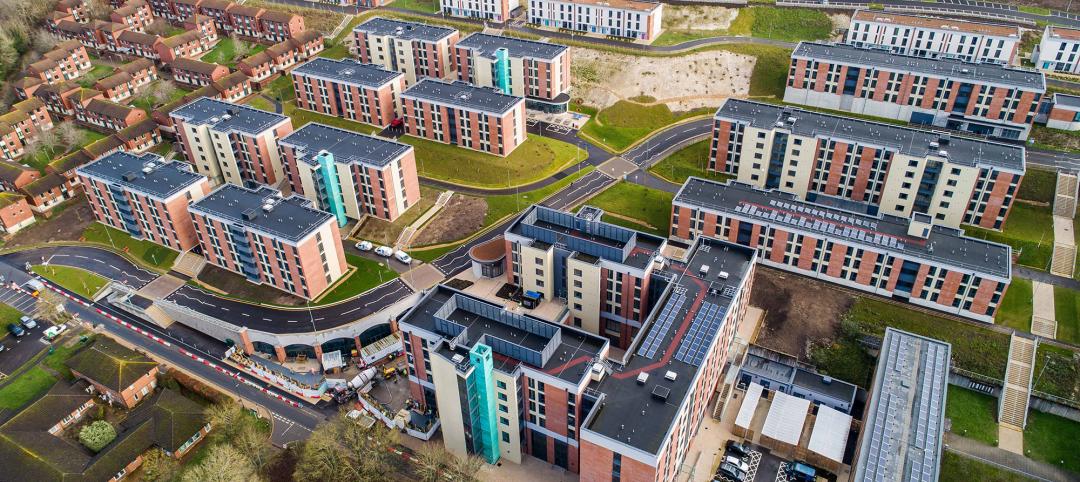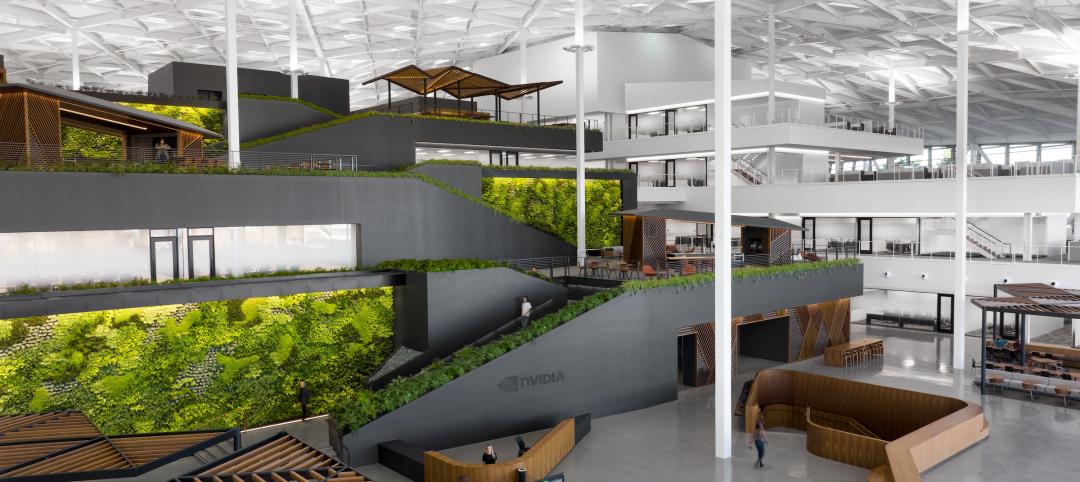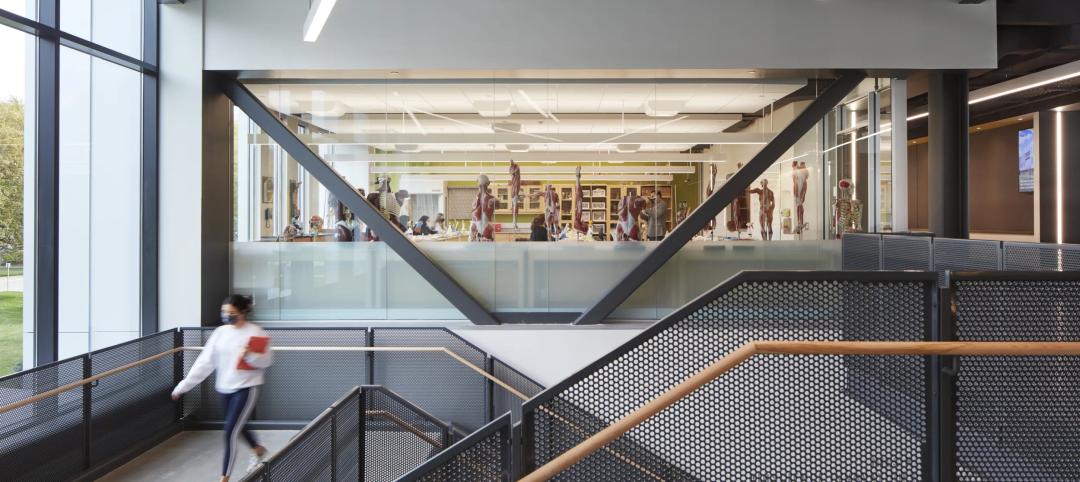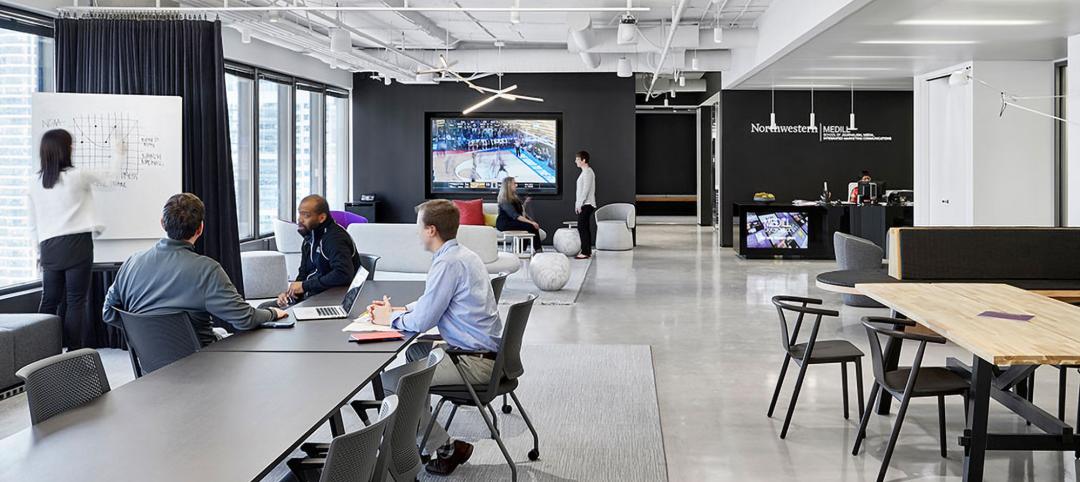Institutions of higher education are under more pressure than ever to demonstrate to students, their parents, and benefactors that a college diploma is worth more than the sheepskin it’s printed on.
To that end, a growing number of colleges and universities are aligning with the research, science, and business sectors that have more input into these schools’ programming, curricula, and even their built environments.
Case in point: In Ohio, Bowling Green State University’s recently opened Robert W. and Patricia A. Maurer Center, the new home for the school’s Allen W. and Carol M. Schmidthorst College of Business. This 50,000-sf building represents a new era for the college, an incubator for study and collaboration that resembles a modern workplace, with the goal of preparing students for real-world careers.

The 50,000-sf Maurer Center is designed to mimic a real-world work environment.
Bowling Green was a leader in this academic-business nexus even before Maurer Center was constructed, as more than 70% of its students have jobs by the time they graduate, says Jessica Figenholtz, AIA, LEED, Associate Principal and Higher Ed Lead with Perkins and Will, the design architect on this project. BD+C interviewed Figenholtz with P&W’s design principals Bryan Schabel and Joseph Connell.
The project’s Building Team included The Collaborative (AOR, construction administration, landscape), Mosser Construction (GC), Schaefer (SE), Wiss, Janney, Elstner Associates (building envelope) ESA Engineers (CE), and JDRM Engineering (ME engineer, technology).
A VARIETY OF STUDY ENVIRONS

The building's classrooms and faculty offices are encased in glass for greater light and transparency.
The business school, which is currently in hybrid learning mode, had its ribbon cutting last September. It includes more than two dozen ways for students to work and study. There are meeting areas of different sizes and on different floors throughout the facility. The design team created a flexible kit of parts that can change as business needs change. Connell points out that the building’s first floor includes two maker spaces, one of which can expand to 2,200 sf, where students can pitch ideas to companies and investors within a combination lounge-conference room setting.
Classrooms with moveable walls and modular furniture allow students to work together easier. There are wall-less cut-out areas on each floor. Classrooms and faculty offices are enclosed by glass walls for greater accessibility and transparency. “The building is designed to create collisions and interactions,” says Schabel.
The biggest change was getting faculty out of their offices, “which required a change in mindset about thinking of offices as castles and places to hide,” says Connell. Figeholtz adds that College of Business Dean Raymond Braun, an attorney, “wanted to shake things up; he wanted the building to reflect the workplace.”
CENTER’S ATRIUM IS A MEETING HUB

A three-story light-filled atrium includes two maker spaces where students can pitch ideas to investors. One of the atrium's walls is a preservation of adjacent Hanna Hall (below) that contrasts the business school's past and future.

Among the prominent design features in the Maurer Center is its light-filled atrium, a hub that encourages a range of student interactions with peers, faculty and employers in stadium seating and terraced small-group meeting areas. The glazed north façade allows natural light to pour into the atrium.
On one side of the three-story atrium is the existing brick wall of Hanna Hall, an adjacent building that has been completely renovated. Connell says the wall was left standing as a “nod” to the school’ history and as a contrast to the Maurer Center.
The Center also features branding and imagery that tells Bowling Green’s story and its prospective future. “This storytelling is an important part of the recruitment experience,” says Connell. Central to the brand visuals is the business school’s focus on data analytics. A dynamic digital ticker embedded in the main stairway enclosure features the business school’s social media feeds and the latest business news.
This is a 24/7 building (first-floor Starbucks included, of course) that Figenholtz says students now perceive as “a place to be seen, day or night.”
Related Stories
Giants 400 | Sep 28, 2023
Top 80 University Building Engineering Firms for 2023
AECOM, Jacobs, BR+A, and Salas O'Brien head BD+C's ranking of the nation's largest university sector engineering and engineering/architecture (EA) firms for 2023, as reported in Building Design+Construction's 2023 Giants 400 Report. Note: This ranking includes revenue for all university/college-related buildings except student residence halls, sports/recreation facilities, laboratories, S+T-related buildings, parking facilities, and performing arts centers (revenue for those buildings are reported in their respective Giants 400 ranking).
Giants 400 | Sep 28, 2023
Top 100 University Building Construction Firms for 2023
Turner Construction, Whiting-Turner Contracting Co., STO Building Group, Suffolk Construction, and Skanska USA top BD+C's ranking of the nation's largest university sector contractors and construction management firms for 2023, as reported in Building Design+Construction's 2023 Giants 400 Report. Note: This ranking includes revenue for all university/college-related buildings except student residence halls, sports/recreation facilities, laboratories, S+T-related buildings, parking facilities, and performing arts centers (revenue for those buildings are reported in their respective Giants 400 ranking).
University Buildings | Sep 27, 2023
Top 170 University Building Architecture Firms for 2023
Gensler, CannonDesign, Page Southerland Page, SmithGroup, and Ayers Saint Gross top the ranking of the nation's largest university sector architecture and architecture/engineering (AE) firms, as reported in Building Design+Construction's 2023 Giants 400 Report.
Contractors | Sep 25, 2023
Balfour Beatty expands its operations in Tampa Bay, Fla.
Balfour Beatty is expanding its leading construction operations into the Tampa Bay area offering specialized and expert services to deliver premier projects along Florida’s Gulf Coast.
Affordable Housing | Sep 25, 2023
3 affordable housing projects that serve as social catalysts
Trish Donnally, Associate Principal, Perkins Eastman, shares insights from three transformative affordable housing projects.
Giants 400 | Aug 22, 2023
Top 115 Architecture Engineering Firms for 2023
Stantec, HDR, Page, HOK, and Arcadis North America top the rankings of the nation's largest architecture engineering (AE) firms for nonresidential building and multifamily housing work, as reported in Building Design+Construction's 2023 Giants 400 Report.
Giants 400 | Aug 22, 2023
2023 Giants 400 Report: Ranking the nation's largest architecture, engineering, and construction firms
A record 552 AEC firms submitted data for BD+C's 2023 Giants 400 Report. The final report includes 137 rankings across 25 building sectors and specialty categories.
Giants 400 | Aug 22, 2023
Top 175 Architecture Firms for 2023
Gensler, HKS, Perkins&Will, Corgan, and Perkins Eastman top the rankings of the nation's largest architecture firms for nonresidential building and multifamily housing work, as reported in Building Design+Construction's 2023 Giants 400 Report.
Higher Education | Aug 22, 2023
How boldly uniting divergent disciplines boosts students’ career viability
CannonDesign's Charles Smith and Patricia Bou argue that spaces designed for interdisciplinary learning will help fuel a strong, resilient generation of students in an ever-changing economy.
Higher Education | Aug 7, 2023
Building a better academic workplace
Gensler's David Craig and Melany Park show how agile, efficient workplaces bring university faculty and staff closer together while supporting individual needs.


